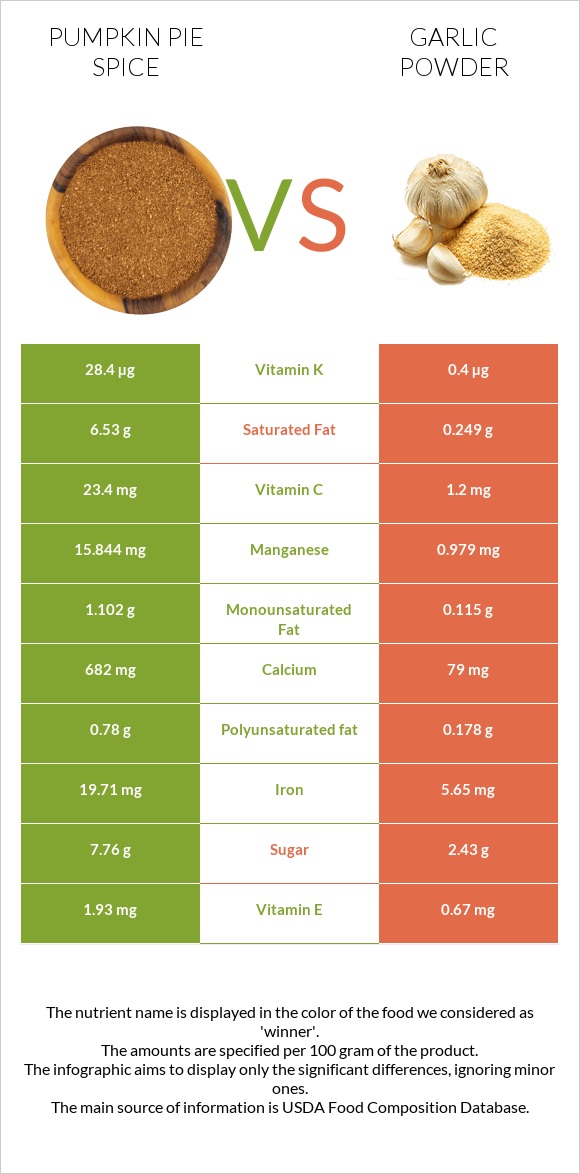Pumpkin pie spice vs. Garlic powder — In-Depth Nutrition Comparison
Compare
A recap on the differences between pumpkin pie spice and garlic powder
- Pumpkin pie spice has more manganese, iron, calcium, vitamin C, and vitamin K; however, garlic powder is higher in vitamin B6, phosphorus, selenium, and vitamin B1.
- Pumpkin pie spice covers your daily manganese needs 646% more than garlic powder.
- Garlic powder contains 71 times less vitamin K than pumpkin pie spice. Pumpkin pie spice contains 28.4µg of vitamin K, while garlic powder contains 0.4µg.
- Garlic powder has less saturated fat.
Food varieties used in this article are Spices, pumpkin pie spice and Spices, garlic powder.
Infographic

Infographic link
Mineral Comparison
Mineral comparison score is based on the number of minerals by which one or the other food is richer. The "coverage" charts below show how much of the daily needs can be covered by 300 grams of the food.
| Contains more MagnesiumMagnesium | +76.6% |
| Contains more CalciumCalcium | +763.3% |
| Contains more IronIron | +248.8% |
| Contains less SodiumSodium | -13.3% |
| Contains more ManganeseManganese | +1518.4% |
| Contains more PotassiumPotassium | +79.9% |
| Contains more CopperCopper | +10.1% |
| Contains more ZincZinc | +26.2% |
| Contains more PhosphorusPhosphorus | +250.8% |
| Contains more SeleniumSelenium | +157% |
Vitamin Comparison
Vitamin comparison score is based on the number of vitamins by which one or the other food is richer. The "coverage" charts below show how much of the daily needs can be covered by 300 grams of the food.
| Contains more Vitamin CVitamin C | +1850% |
| Contains more Vitamin AVitamin A | +∞% |
| Contains more Vitamin EVitamin E | +188.1% |
| Contains more Vitamin B3Vitamin B3 | +181.8% |
| Contains more Vitamin KVitamin K | +7000% |
| Contains more Vitamin B1Vitamin B1 | +232.1% |
| Contains more Vitamin B6Vitamin B6 | +313.5% |
| Contains more FolateFolate | +95.8% |
All nutrients comparison - raw data values
| Nutrient |  |
 |
DV% diff. |
| Manganese | 15.844mg | 0.979mg | 646% |
| Iron | 19.71mg | 5.65mg | 176% |
| Vitamin B6 | 0.4mg | 1.654mg | 96% |
| Calcium | 682mg | 79mg | 60% |
| Phosphorus | 118mg | 414mg | 42% |
| Saturated fat | 6.53g | 0.249g | 29% |
| Selenium | 9.3µg | 23.9µg | 27% |
| Vitamin C | 23.4mg | 1.2mg | 25% |
| Vitamin B1 | 0.131mg | 0.435mg | 25% |
| Fiber | 14.8g | 9g | 23% |
| Vitamin K | 28.4µg | 0.4µg | 23% |
| Protein | 5.76g | 16.55g | 22% |
| Fats | 12.6g | 0.73g | 18% |
| Potassium | 663mg | 1193mg | 16% |
| Vitamin B5 | 0.743mg | 15% | |
| Magnesium | 136mg | 77mg | 14% |
| Vitamin B3 | 2.243mg | 0.796mg | 9% |
| Vitamin E | 1.93mg | 0.67mg | 8% |
| Choline | 20.8mg | 67.5mg | 8% |
| Zinc | 2.37mg | 2.99mg | 6% |
| Folate | 24µg | 47µg | 6% |
| Copper | 0.484mg | 0.533mg | 5% |
| Polyunsaturated fat | 0.78g | 0.178g | 4% |
| Monounsaturated fat | 1.102g | 0.115g | 2% |
| Calories | 342kcal | 331kcal | 1% |
| Carbs | 69.28g | 72.73g | 1% |
| Vitamin A | 13µg | 0µg | 1% |
| Net carbs | 54.48g | 63.73g | N/A |
| Sugar | 7.76g | 2.43g | N/A |
| Sodium | 52mg | 60mg | 0% |
| Vitamin B2 | 0.137mg | 0.141mg | 0% |
| Tryptophan | 0.121mg | 0% | |
| Threonine | 0.374mg | 0% | |
| Isoleucine | 0.414mg | 0% | |
| Leucine | 0.728mg | 0% | |
| Lysine | 0.768mg | 0% | |
| Methionine | 0.111mg | 0% | |
| Phenylalanine | 0.525mg | 0% | |
| Valine | 0.667mg | 0% | |
| Histidine | 0.263mg | 0% | |
| Fructose | 0.31g | 0% | |
| Omega-3 - ALA | 0.012g | N/A | |
| Omega-6 - Eicosadienoic acid | 0.022g | N/A |
Macronutrient Comparison
Macronutrient breakdown side-by-side comparison
Protein:
5.76 g
Fats:
12.6 g
Carbs:
69.28 g
Water:
8.46 g
Other:
3.9 g
Protein:
16.55 g
Fats:
0.73 g
Carbs:
72.73 g
Water:
6.45 g
Other:
3.54 g
| Contains more FatsFats | +1626% |
| Contains more WaterWater | +31.2% |
| Contains more ProteinProtein | +187.3% |
~equal in
Carbs
~72.73g
~equal in
Other
~3.54g
Fat Type Comparison
Fat type breakdown side-by-side comparison
Saturated fat:
Sat. Fat
6.53 g
Monounsaturated fat:
Mono. Fat
1.102 g
Polyunsaturated fat:
Poly. Fat
0.78 g
Saturated fat:
Sat. Fat
0.249 g
Monounsaturated fat:
Mono. Fat
0.115 g
Polyunsaturated fat:
Poly. Fat
0.178 g
| Contains more Mono. FatMonounsaturated fat | +858.3% |
| Contains more Poly. FatPolyunsaturated fat | +338.2% |
| Contains less Sat. FatSaturated fat | -96.2% |





